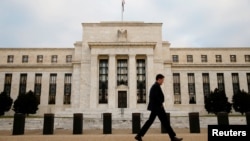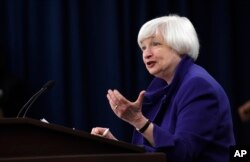Top officials of the U.S. central bank are debating how soon and how much to raise the key interest rate, and are set to announce a decision next Wednesday (June 15).
Federal Reserve officials are supposed to manage the U.S. economy to encourage full employment and stable prices, and manipulating the benchmark interest rate is an important tool in that effort.
Many analysts had been anticipating a rate increase as early as June or July, but recent economic data showed unexpected weakness in the job market.
Economist Ken Simonson of the National Association for Business Economics said May’s tepid job gains could make Fed officials pause when they meet in mid-June. “I think that this really sends a strong signal that they're not going to try to raise rates now.”
That May report shows the U.S. economy added only 38,000 jobs last month, fewer than other recent months.
Fed Chair Janet Yellen said the numbers are discouraging but should be kept in perspective. "Although this recent labor market report was, on balance, concerning, let me emphasize that one should never attach too much significance to any single monthly report."
Yellen said the Fed will boost rates gradually and carefully when economic data show a stronger labor market, and inflation rises closer to the modest 2 percent rate that experts say helps the economy.
A long period of low oil prices helped cut inflation so low that experts were worried about deflation, for a while. The concern about deflation is that falling prices might spiral out of control, cut demand and hurt the economy.
The American Bankers Association said the disappointing job numbers and weak overseas demand mean caution is appropriate.
“In light of continuing International uncertainty; in light of the need to get a clear view of where the American employment picture is going with it, the cautious stance of the Federal Reserve is certainly warranted at this time,” according to Carl Tannenbaum, a key ABA member and chief economist of Northern Trust bank.
Tannenbaum spoke with journalists about an ABA report by top economists from 16 major banks who said they still expect two interest rate increases at some point this year, and two more next year.
Meanwhile, Ken Simonson, of the National Association for Business Economics, said the presidential election campaign may be another complication for officials trying to time an interest rate increase.
The election caveat
“Any move in the two or three months right before the U.S. presidential election would be interpreted by many people as trying to influence the election outcome,” he said.
Experts say perceived political involvement could undermine the independence that central banks need to make decisions based on economic considerations that may be politically unpopular.
The debate over raising interest rates is one example. Low interest rates are intended to boost economic growth and cut unemployment. That is why consumer and labor groups often support such policies; but, some banks and businesses worry that keeping interest rates too low for too long could spark soaring inflation and hurt prosperity and jobs.
Interest rates were cut to historic lows during the global economic crisis, and were raised very slightly late last year. Even with that increase, they remain far below their usual average levels. Fed officials gather about every six weeks to consider economic issues and debate policy changes.





